THE ALIEN: SERGEI VASYLEVICH RACHMANINOFF (1873-1943)
If you imagine yourself who finds himself, down a dark and lonely street in the middle of the night, a very tall man, with a broad physical build, very short hair, large and separated knuckles (which denote aggressive personality according to Conan Doyle), enormous hands, with very marked features of the face, wide lips and with a hieratic expression, with a face of “few friends”, dressed elegantly.
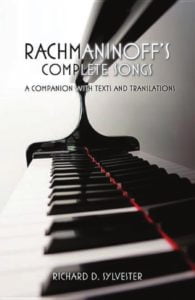
If this man approaches you in those circumstances, at the very least, I would be afraid. At that moment, he asks: What time is it, please? Then you would calm down a lot, and he would observe a slight smile on Rachmaninoff’s face, almost like that of the Mona Lisa“.
Sometimes the appearances deceive. Many pianists need to move their body a lot to give lyricism to their interpretations.
However, others are like rocks in front of a piano, and yet still get performances much deeper and more lyrical than the previous ones. This is the case of Rachmaninoff, and also of Arthur Rubinstein.
Best Sheet Music download from our Library.
In the book of Harold C. Schönberg “The Great Pianists”, in a chapter titled “the puritan”, it is said:
“(…) The tall, dour, lank, unsmiling figure of Sergei Rachmaninoff, with its seamed face and head of close-cropped (almost shaved) hair, invariably reminded the public of a convict on the loose.”
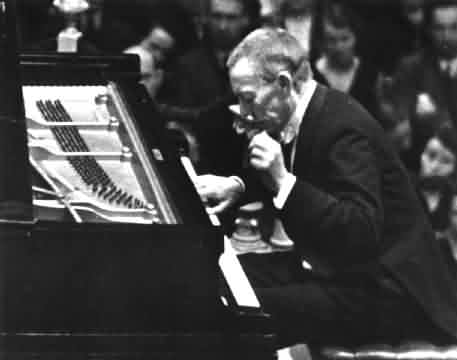
Rachmaninoff in concert.
This phantasmagorical character that the figure of Rachmaninoff produces, this impression aural, has a faithful reflection in his music.
At conceptual levels, something The same is true of Liszt. While Liszt reflects on us a music full of mythological fights, conflicts between life and death, Rachmaninoff shows a ghostly, ironic personality, like someone who thinks that these deep thoughts can be better expressed in a way ironic, sometimes humorous, reflecting it in a music full of contrasts, almost appearing superficial.
But it is quite the opposite, what he actually demonstrates is honesty and naturalness, evidence of being a primary music that is born from the heart. Precisely there is the Rachmaninoff’s magical personality.
Its music, sincere in itself, it does not obey objectionable musical tendencies musically, Rachmaninoff belongs neither to romanticism nor to classicism nor to post-romanticism. Rachmaninoff has always been accused of being a conservative, of anti-novel.
Quite the opposite of what is thought: You have to be brave to compose in that style, while they were already making their first steps into music in entirely new languages. And it is that the difficulty of classification of Rachmaninoff’s music within a period is totally logical since his music is so personal to him, so born from the heart, which does not require the use of new resources or pursues originality in language.
Although we can say that his music is typically Russian, he always argued that he never proposed to make Russian music, but his music is like that because he is So.
Rachmaninoff was always very reluctant to reveal his source of inspiration. About his creative process, he used to say these words: “I hear the music in my head. When the music stops, I stop writing.”
He once recounted to a journalist that his inspiration in many cases came from sources literary or pictorial. It is known that “The Isle of Dead” was composed after observing some paintings by Arnold Böcklin with the same title. In this same painter, the Studies-Tableau of him are inspired. But Rachmaninoff was very insistent that his sources of inspiration were not more than inspirations, and not previous programs to develop the pieces, except in one piece:
The “diabolical” study in La minor Op.39 n.6, one of the three that he recorded, and that as he himself commented to Respighi in a letter, is the musical expression of the tale popular fairy tale “Little Red Riding Hood”, of which he is also participate in the Prokoffian “Diabolical Suggestion”.
Please, subscribe to our Library.
If you are already a subscriber, please, check our NEW SCORES’ page every month for new sheet music. THANK YOU!
But after a first analysis, it is clear to deduce that there are two leitmotifs that appear and reappear in Rachmaninoff’s music:
On the one hand the sound of bells from his early years in St. Petersburg, taking the maximum expression of him in “The bells”, his favorite of among his compositions. We can also quote the prelude Op.32 N.3 in My biggest.
On the other hand we must talk about Russian Orthodox choral music, which made a great impression on him, as did the music of North America, of which we can find traces in numerous pieces, in special in the Rhapsody on a Theme by Paganini, which conjugates music American with his personal Russian flair; and of course, in his room concerto, of which the second movement is inspired by a spiritual black.
Rachmaninoff shared with his friend Feodor Chaliapin the firm conviction that a piece always had a unique climax. This interpretive method consisted of determining in each piece what the climax is, and everything In addition, each “p” or each “ff” must lead to that climax, or come out of it.
It is an axis on which the interpretation is based of the piece, a spotlight placed exactly in the ideal place, which illuminates the interpretation as if it were light in a pictorial creation.
The method of Rachmaninoff’s study consists of working on a piece of music as if you were the composer yourself, dividing the study into different phases.
Expressing it in his own words: “You must take the work apart, peer into every corner, before you can assemble the whole” . Of course, always keeping a logic with about the “turning point,” or climax.
The worst review that he himself could do at the end of a recital is to forget that point culminating. It made no difference to the interpretation of this or that passage were great, as he himself recounted: “either the whole made sense, or nothing did”.
This is a globalizing conception of a piece of music, means putting oneself in the place of the composer and not limited to being an interpreter, is the difference between the architect and the mason. The mason builds the brick house brick, the architect has it all in his head.
To Rachmaninoff only two or three conductors understood truly his work: Eugene Ormandy (New York Philharmonic), Leopold Stokowsky (Philadelphia P.), and Dimitri Mitropoulos.
Currently tends to underestimate Rachmaninoff’s recordings, to classify them within an interpretive style belonging to a period historical-musical. It tends to “romanticize” the music of Rachmaninoff, to make numerous ritardandos in the most lyrical passages, to play the slower music of him.
This is supposed to be a trend of the current musical thought, but nevertheless I advocate because it is about a misconception. A big mistake. All these piano players that play so their music, they don’t understand Rachmaninoff at all. Being lovers and studious of his music and his figure, we would give these recommendations of practices for pianists trying to play and understand his music:
1º.- The most important is to establish the climax of the piece, its high point. Does not have why be a short passage, nor does it have to be in “fff”, it is simply the harmonic and formal climax. It has to be studied formally the piece in a first stage.
2º.- The accents. Rhythm is essential at Rachmaninoff, you have to keep it up from start to finish unless otherwise stated. Forget the ritardandos and mannerist sensitizations at each end of phrase. You should always accentuate the strong part of each measure, in addition to the corresponding accents as written in the music sheet. You have to respect the score, looking for editions that are not reviewed by anyone other than Rachmaninoff himself.
3º.- The contrasts. There must be diabolical, phantasmagorical contrasts, it must give “fear”, between the Forte and the Piano. The fabulous technique of Rachmaninoff allowed him to make such contrasts at a speed higher.
4º.- Many Sometimes melodies are interspersed in a great way, playing with the voices. These melodies have to be heard as if it were a fugue, as as Rachmaninoff does in his recordings.
5º.- Stretch the hand to the max The only way for Rachmaninoff’s music to sound to Rachmaninoff is to use fingerings apparently “impossible” because of the extent they entail, but with the study are becoming affordable. The jumps think of them as extensions. The fear of jumping is only in your head, not in your fingers. reject editions with finger crossings and special fingerings for hands little.
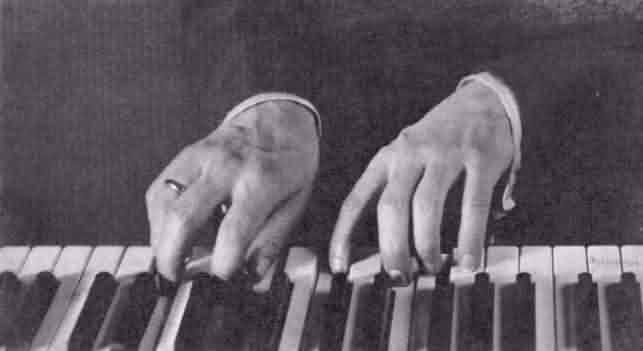
Rachmaninoff’s hands
6º.- You don’t have to get scared or self-conscious hearing how quickly Rachmaninoff plays this one or that passage. Rachmaninoff only existed one, let’s not try to imitate the verbatim what he does, but if he does it quickly, we must try to do it like this. On the other hand, do not fall into the error of consider Rachmaninoff as a “machine”: what He plays fast, showing enormous talent and giving balance to the whole piece, because his technique allows it, let’s not be envious, let’s be humble and recognize our limitations!
Rachmaninoff himself was full of contradictions and was never happy with his interpretations of him, he even went through a period of depressions, from which he got out thanks to the help of psychiatrist Dr. Nikolai Dahl, and to whom he dedicated the second concert to him.
Must be realized the enormous talent of Rachmaninoff, playing his compositions. It is about perceiving something spiritual, something that cannot be studied or to say in words, to understand the austere Russian spirit, ironic, intelligent, phantasmagorical, of Rachmaninoff. Getting to cry listening to his Humoresca in G Op.10 n.5, or coming to hate his second concerto for piano and orchestra (comparing it with his other concertos, of course), they are not contradictory attitudes.
If we pretend to introduce you to a deeper Rachmaninoff than the Rachmaninoff that fans know, we’d suggest these pieces: Variations on a Theme of Corelli, Sonata No.2 for solo piano, Concerto No. 4 for piano and orchestra, Humoresca… and actually, many, many more, that are not usually played in concert halls due to their tremendous difficulty. Any pianist will recognize that it is much easier to play a concerto by Liszt or one by Chopin, than to start studying one by Rachmaninoff.
Hoping these tips help you, and you end up loving Rachmaninoff like many we already do it. But do not try to believe that you know how to play this or that Rachmaninoff’s piece without first having searched for and heard his recording: you will have big surprises. Hoping that from those clashes between the personality of each one and that of Rachmaninoff himself, visions are born positive and fruitful, and you understand this genius better.
The figure of Rachmaninoff is becoming more and more popular, proof of this and What is nice is the fact that web pages on the Internet containing the name “Rachmaninoff” are the most visited of among all the classical music websites, according to the counters of visits.
To end we’d conclude with two sentences, the first collected from a letter from Rachmaninoff to Medtner, after a series of recitals, about the “Variations on a Theme by Corelli”, and the second a comment that I subscribe:
“Not played them in full once. I was guided by the coughing of the public. When the coughing increased, I would leave out the next variation … In one concert … the coughing was such that I played only 10 variations … My record was 18. However, I hope that you will play them all and that you will not cough”.
“Rachmaninoff was made of steel and gold; steel in his arms, gold in his heart. I can never think of this majestic being without tears in my eyes, for i not only admired him as a supreme artist, but i also loved him as a man” ( Josef Hofmann, “In memory of Rachmaninoff”).
Browse in the Library:
| Artist or Composer / Score name | Cover | List of Contents |
|---|---|---|
| Antonio Carlos Jobim – One Note Samba (guitar TABS sheet music) | Jobim – One Note Samba (guitar TABS sheet music) | |
| Antonio Carlos Jobim – Samba De Uma Nota So | ||
| Antonio Carlos Jobim – Se Todos Fossem Iguais A Voce arr. by Baden Powell (Guitar arr. sheet music with TABs) | Antonio Carlos Jobim – Se Todos Fossem Iguais A Voce arr. by Baden Powell (Guitar arr. sheet music with TABs) | |
| Antonio Carlos Jobim – Tom Jobim For solo Guitar with TABs |
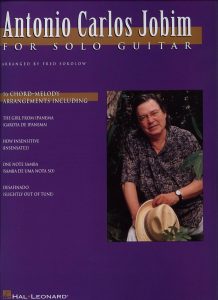 |
Tom Jobim for Solo Guitar |
| Antonio Carlos Jobim – Triste (Guitar Solo Arr. With Tabs Sheet Music) (Musescore File).mscz | ||
| Antonio Carlos Jobim 9 Pieces Guitar TABs |
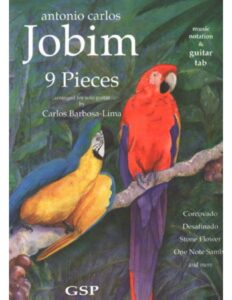 |
Jobim 9 pieces guitar |
| Antonio Carlos Jobim And Chico Buarque Eu Te Amo (Arr. For Guitar By Carles Trepat) |
 |
|
| Antonio Carlos Jobim and the art of Bossa Nova Jazz Play Along Volume 08 with audio MP3 |
 |
Antonio Carlos Jobim Jazz Play-Along Volume 08 – with audio MP3_compressed |
| Antonio Carlos Jobim Anthology (Piano vocal and guitar) |
 |
Antonio Carlos Jobim Anthology (Piano vocal and guitar) |
| Antonio Carlos Jobim for Classical Guitar (Paulo Bellinati Mel Bay 2008) |
 |
Antonio Carlos Jobim for Classical Guitar |
| Antonio Carlos Jobim Jazz Piano solos Vol. 17 |
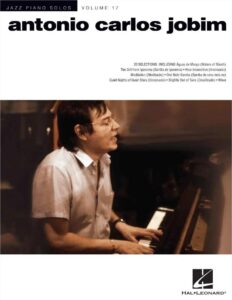 |
Antonio Carlos Jobim Jazz Piano solos Vol. 17 sheet music pdf |
| Antonio Carlos Jobim Jazz Play Along Vol. 08 with audio MP3 |
 |
Antonio Carlos Jobim Jazz Play-Along Volume 08 – with audio MP3_compressed |
| Antonio Carlos Jobim Quebra Pedra (Stone Flower) – Tom Jobim Piano and Guitar chords |
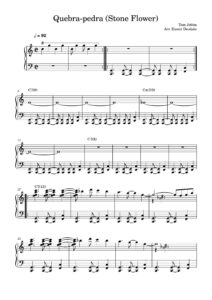 |
|
| Antonio Carlos Jobim Stone Flower (Songbook) Quebra-pedra Tom Jobim Piano Vocal guitar Chords |
 |
Antonio Carlos Jobim Stone Flower (Songbook) Tom Jobim Piano Vocal guitar Chords |
| Antonio Carlos Jobim Tom Jobim – Luiza Guitar Solo |
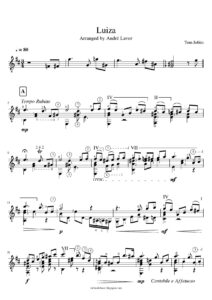 |
|
| Antonio Carlos Jobim Tom Jobim Corcovado arr. for Guitar Violao by Rubinho | Antonio Carlos Jobim Tom Jobim Corcovado arr. for Guitar Violao by Rubinho | |
| Antonio Carlos Jobim Wave (Piano Guitar) |
 |
Antonio Carlos Jobim Wave (Piano Guitar) |
| Anywhere the heart goes (The Thorn birds – Uccelli di rovo) | ||
| Aphex Twin – aisatsana |
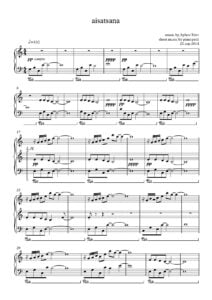 |
|
| Aphex Twin – Avril 14th |
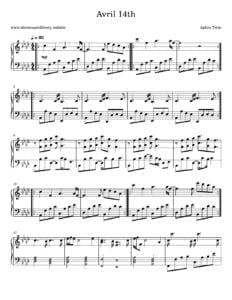 |
|
| Aphex Twin – Avril 14th (Musescore File).mscz | ||
| Aphex Twin – Kesson Daslef |
 |
|
| April In Paris Vernon Duke E.Y. Harburg 1932 Jazz Standard (Vintage sheet music) |
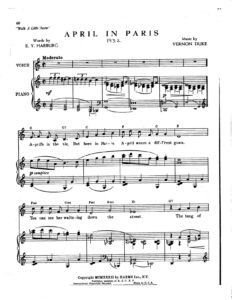 |
|
| Aqua – Doctor Jones | ||
| Aquaman Everything I Need Skylar Grey Piano solo |
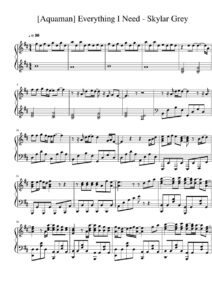 |
|
| Aram Khachaturian – Sabeltanz Aus Gayaneh (Pianoforte 4 hands) | Aram Khachaturian – Sabeltanz Aus Gayaneh (Pianoforte A 4 Mani) | |
| Aranjuez Ma Pensee (ver. for voice and guitar by the composer) |
 |
Aranjuez Ma Pensee |
| Aretha Franklin – Chain Of Fools | ||
| Aretha Franklin – Respect | ||
| Aretha Franklin Songbook |
 |
Aretha Franklin Songbook |
| Aretha Franklin Songbook 1 |
 |
Aretha Franklin Songbook 1 |
| Aretha Franklin Songbook 2 |
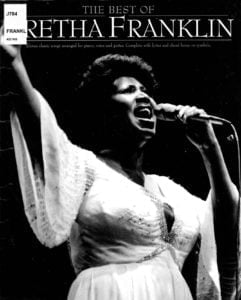 |
Aretha Franklin Songbook 2 |
| Aretha Franklin The Very Best of The 60s |
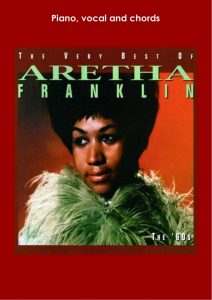 |
Aretha Franklin best of 60s |
| Ari Hoenig Songbook |
 |
Ari Hoenig Songbook |
| Ari Pulkkinen – Angry Birds Theme Song | Ari Pulkkinen – Angry Birds Theme Song | |
| Aria (Cantilena) by Heitor Villa-Lobos.mscz | ||
| Aria di neve (Sergio Endrigo) | ||
| Ariana Grande – 7 Rings Sheet Music |
 |
|
| Ariana Grande – Bang Bang Sheet Music piano Vocal Guitar chords |
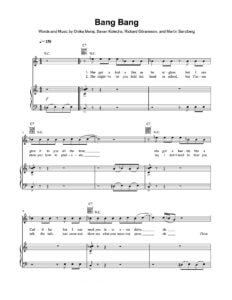 |
|
| Ariana Grande – No Tears Left to Cry Sheet Music |
 |
|
| Ariana Grande Tattooed Heart | Ariana Grande-Tattooed heArt | |
| Ariel Ramírez – Alfonsina Y El Mar (Guitar) arr. by Roland Dyens | Ariel Ramírez – Alfonsina Y El Mar (Guitar) arr. by Roland Dyens | |
| Ariel Ramírez – Alfonsina Y El Mar (Piano) | Ariel Ramírez – Alfonsina Y El Mar (Piano) | |
| Arlen, Harold Stormy weather – piano | Stormy weather – piano | |
| Armageddon (Piano & Guitar Chords) |
 |
Armageddon (Piano & Guitar Chords) |
| Arnold Schoenberg, Gerald Strang, Leonard Stein-Fundamentals of Musical Composition-Faber & Faber (1982) Book |
 |
|
| Around The Campfire Peter, Paul and Mary – Guitar songbook |
 |
Around The Campfire Peter Paul & Mary songbook |
| Arpeggios For The Modern Guitarist Tabs by Will Johnson |
 |
Arpeggios For The Modern Guitarist Tabs by Will Johnson |
| Arranging And Composing for the small ensemble Jazz R&B Jazz-Rock (by David Baker) |
 |
|
| Arrival Of The Birds from The Crimson Wing Mystery of the Flamingos piano solo |
 |
|
| Arrival Of The Birds The Theory of Everything – The Cinematic Orchestra Piano Solo |
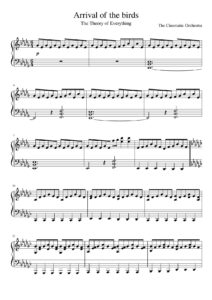 |
|
| Arrival Of The Birds The Theory of Everything Ending Scene Music – The Cinematic Orchestra Piano Solo |
 |
|
| Art Blakey And The Jazz Messanger Bobby Timmons – Moanin’ |
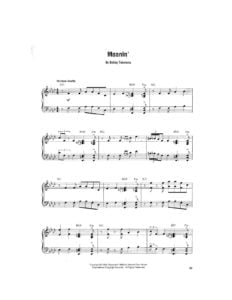 |
|
| Art Of Composing Music (Published In London (1751) |
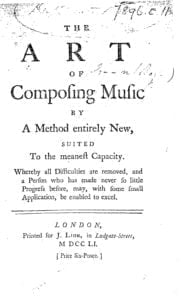 |
|
| Art Of Gospel Guitar – El McMeen with Tablature |
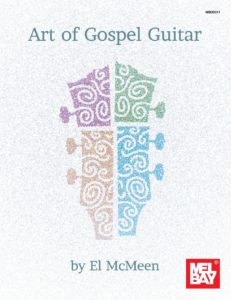 |
Gospel guitar |
| Art of Jazz improvisation book 3 Intermadiate by Bob Taylor |
 |
|
| Art Pepper Collection Solos Artist Transcriptions Saxophone |
 |
art pepper solos sheet music |
| Art Tatum As Time Goes By |
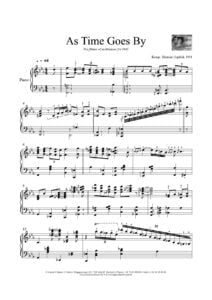 |
|
| Art Tatum – Tiger Rag (Jazz Standard by the Original Dixieland Jass Band) (piano sheet music) | Art Tatum – Tiger Rag (Jazz Standard by the Original Dixieland Jass Band) (piano sheet music) | |
| Art Tatum – All The Things You Are |
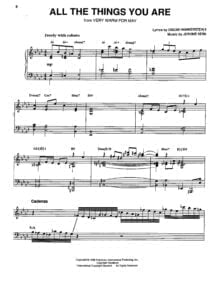 |
|
| Art Tatum – Cherokee |
 |
|
| Art Tatum – Gershwin – The Man I Love (Piano as played by) | Art Tatum Gershwin The-Man-I-Love-Piano | |
| Art Tatum – Jazz Piano solos Vol. 2 |
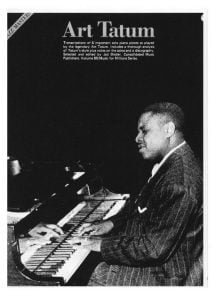 |
Art Tatum Jazz piano solos vol. 2 |
| Art Tatum – New Beginnings A Piano Imrovisation | Art Tatum – New Beginnings A Piano Imrovisation | |
| Art Tatum – Tea For Two (Sheet Music) (Musescore File).mscz | ||
| Art Tatum – Tiger Rag (Sheet Music) (Musescore File).mscz | ||
| Art Tatum – Too Marvelous for Words The Life and Genius of Art Tatum (Book by James Lester) |
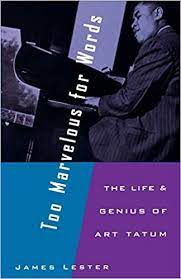 |
|
| Art Tatum 5 Jazz Piano Solos transcribed By Frank Paparelli |
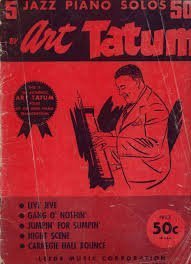 |
Art Tatum 5 Jazz Solos By Frank Paparelli – 1944 Songbook |
| Art Tatum Artist Transcriptions Solo Book |
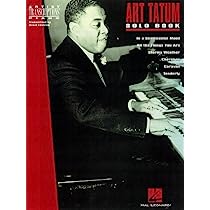 |
Art Tatum |
| Art Tatum Improvisations Piano sheet music |
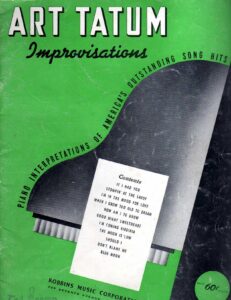 |
Art Tatum Improvisations Piano sheet music |
| Art Tatum Jazz Arr. Begin The Beguine (Musescore File).mscz | ||
| Art Tatum Jazz Arr. Cole Porte Begin The Beguine |
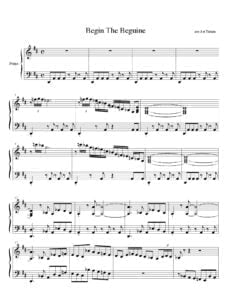 |
|
| Art Tatum New Beginnings (Musescore File).mscz | ||
| Art Tatum Stormy Weather Ted Koehler – Harold Arlen | T.Koehler-H.Arlen – Stormy Weather (arr. A.Tatum) | |
| Art Tatum Tea For Two (Vincent Youmans) |
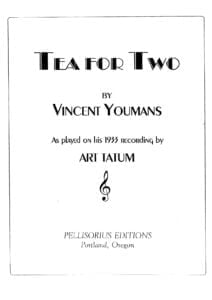 |
|
| Arthur A. Reblitz – Piano servicing, tuning, and rebuilding for the professional, the student, and the hobbyist |
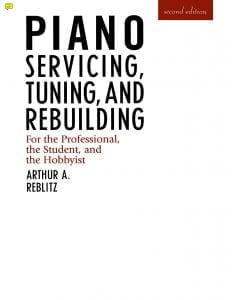 |
|
| Artic Monkeys – Only Ones Who Know | ||
| Artie Shaw – Jazz Technic Book 1 Scales and Exercises |
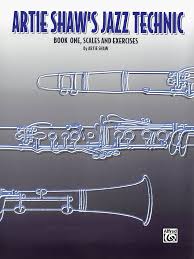 |
Artie Shaw – Jazz Technic Book 1 Scales and Exercises |
| Artie Shaw – Clarinet Method |
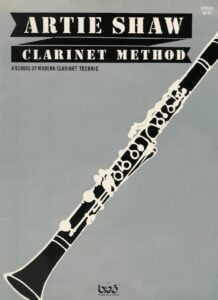 |
|
| Artie Shaw – Concerto for Clarinet for solo Bb Clarinet with Piano accompaniment |
 |
|
| Artie Shaw – Moonglow Clarinet sheet music |
 |
|
| Artie Shaw His Life And Music by John White (Book) Biography |
 |
|
| Artpop Lady Gaga Songbook |
 |
|
| Arturo Sandoval – Sandunga Alto Sax | Arturo Sandoval – Sandunga Alto Sax | |
| Arturo Sandoval – Trumpet Method |
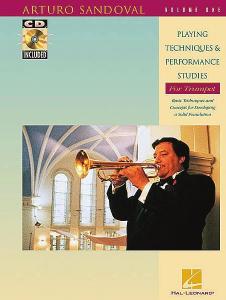 |
|
| Arvo Part Fratres Piano Sheet music |
 |
|
| Arvo Pärt Partita For Piano, Op 2 (1960) |
 |
|
| Arvo Pärt Spiegel Im Spiegel (Violoncello And Piano) |
 |
|
| Arvo Part Summa for Strings | Arvo Part Summa for Strings | |
| Arvo Part – Fur Alina Variations | Arvo Part – Fur Alina Variations | |
| Arvo Pärt – Zwei Sonatinen Für Klavier Op. 1 |
 |
|
| Arvo Pärt Out Of Silence (Peter C. Bouteneff) Book |
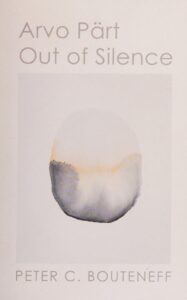 |
|
| Arvo Pärt Sounding The Sacred Book by Peter C. Bouteneff Jeffers Engelhardt Robert Saler |
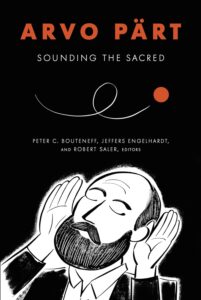 |
|
| Arvo Pärt Spiegel Im Spiegel (arranged for Piano Solo) | Arvo Pärt – Spiegel Im Spiegel (arranged for Piano Solo) | |
| Arvo Pärt Spiegel Im Spiegel Violin Piano |
 |
|
| Ary Barroso – Amor Fatal Fox triste (piano) |
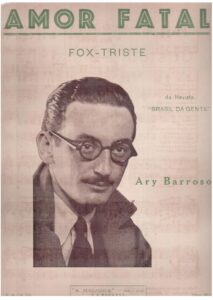 |
|
| Ary Barroso – Aquarela Do Brasil (Samba) Guitar Solo |
 |
|
| Ary Barroso – Aquarela Do Brasil (Samba) Guitar Solo TABs |
 |
|
| Ary Barroso – Aquarela Do Brasil (Samba) Guitar Solo.mscz | ||
| Ary Barroso – Aquarela do Brasil Piano Vocal | Ary Barroso-Aquarela do Brasil | |
| Ary Barroso – Tenho Saudade! Samba Cançao (piano) |
 |
|
| Ary Barroso Aquarela Do Brasil Arr Carlos Barbosa Lima for guitar | Ary Barroso Aquarela Do Brasil Arr Carlos Barbosa Lima for guitar | |
| Ary Barroso Guitar 1 songbook (arr. by Almir Chediak) |
 |
Ary Barroso Guitar 2 songbook (arr. by Almir Chediak) |
| Ary Barroso Guitar 2 songbook (arr. by Almir Chediak) |
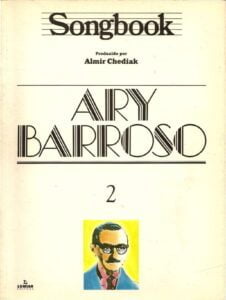 |
Ary Barroso Guitar 2 songbook (arr. by Almir Chediak) |
| As 101 Melhores Canções Do Século XX – Vol 2 – Almir Chediak (Guitar) |
 |
As 101 Melhores Canções Do Século XX – Vol 2 |
| As 101 melhores cançoes do século XX Vol. 1 (Almir Chediak) |
 |
As 101 Melhores Canções Do Século XX – Vol 2 |
| As Time Goes By (Musescore File).mscz | ||
| Ashanti – The Way That I Love | ||
| Asking you (Green Card OST) Hans Zimmer | ||
| Assassin’s Creed Rogue – Main Theme |
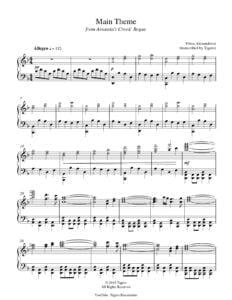 |
|
| ASSASSINS – The Musical Sondheim-Weidman (Piano & Vocal) |
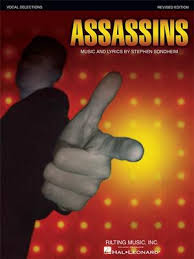 |
ASSASSINS – The Musical Sondheim-Weidman (Piano & Vocal) |
| Assassins Creed 2 – Ezios Family |
 |
|
| Assassins Creed III Main Theme |
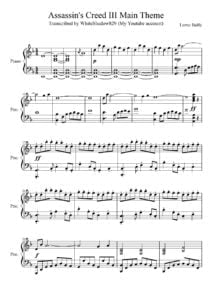 |
|
| Astor Piazolla – Adios Nonino | ||
| Astor Piazolla Libertango Violin And Piano | Astor Piazolla Libertango Violin And Piano | |
| Astor Piazzola – Libertango (piano arr.) |
 |
|
| Astor Piazzola – Libertango (Piano Solo) |
 |
|
| Astor Piazzola – Play Piazzolla 13 Tangos By Astor Piazzolla EASY GUITAR ARR. |
 |
Astor Piazzola – Play Piazzolla 13 Tangos By Astor Piazzolla EASY GUITAR ARR. |
| Astor Piazzola Oblivion Guitar Arr. By Nadja Kossinskaja |
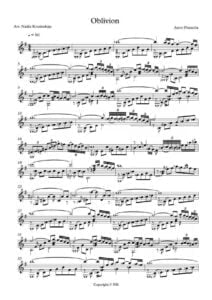 |
Piazzola Oblivion Guitar arr. by Nadja Kossinskaja page 1-1 |
| Astor Piazzolla 12 Tangos Piano |
 |
